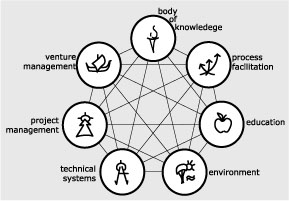 7
Domains Audit Workshops
7
Domains Audit Workshops
The
7 Domains® model (pictured at right) is designed
to serve as a map to a sustainable future for
individuals and institutions in an interdependent
global environment.
7
Domains¨ Audit Workshops, utilizing patented
processes and methods, systematically and
comprehensively examine, analyze, and assess the
health and coherency of an organization or enterprise
operating in a knowledge-intensive environment.
These
events are typically two or three days in
length and can involve anywhere from ten to
a hundred participants, depending upon the
scope and scale of the Audit.
MG
Taylor has conducted 7 Domains Audit Workshops
with organizations including Detroit Energy,
General Motors, University of Notre
Dame Mendoza College of Business and Warner-Lambert.
About
the 7 Domains Model
As
human cultures and economies expand from industrial
to knowledge-based modes of production, new
definitions of value and wealth are arising.
Conversations about capital theory have already
begun to include notions of knowledge, social,
and even, spiritual capital. If these are
indeed the new means of production, then the
debate as to who owns them and how they are
accounted for, has only just begun. Clearly,
the bottom line in a free society has to do
with how people work together, what it is
they choose to produce and how commonwealth
is shared. To a large extent the current expansion
is the result of several decades of rapid
advance in microprocessor-based technology.
It is evident, however, that fundamental change
in the way these harder technologies are employed
is yet to be realized. Just putting them to
use inside of industrial-style organizations
does not change the way the world works. In
the near term, it will be on the softer side,
through investment of these new forms of so-called
capital, that history-making innovations in
social organization will occur.
MG
Taylor created the 7
Domains model in the 1980's to reflect a fundamental
shift in management theory and practice. In the
new world of work, people and things, the soft
and the hard, do not need to be managed. The new
role of management is to sustain the conditions
in which creativity, innovation and new knowledge
emerge within networks of interaction.

